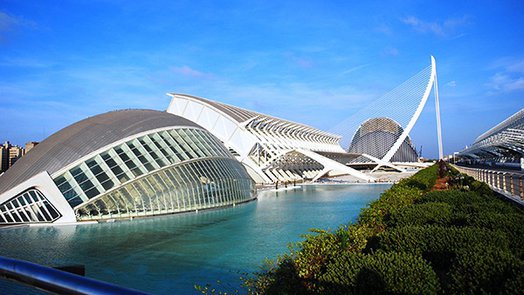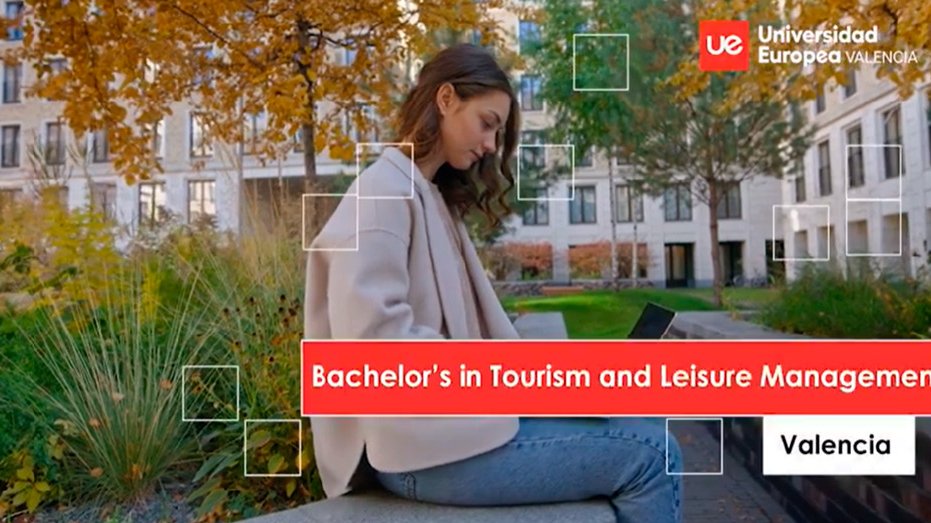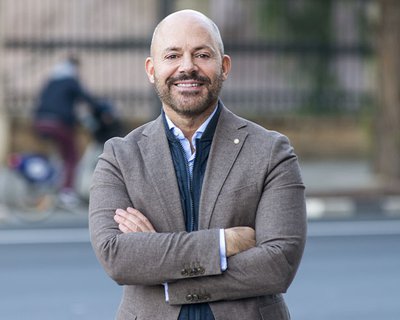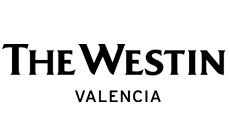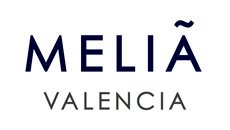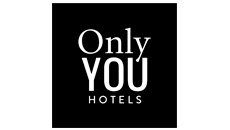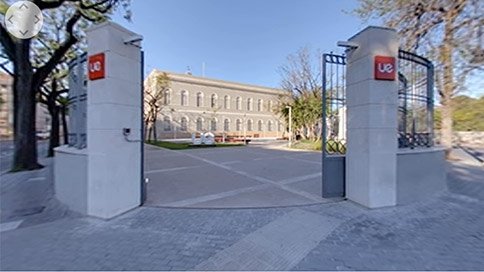-50% Discount on place reservation for 26/27 intake until Frebruary 28th!
Bachelor's in Tourism and Leisure Management
The Bachelor's in Tourism and Leisure Management at Universidad Europea is a 4-year degree aimed at providing you with the knowledge and skills to lead in the ever-changing tourism sector.
By studying tourism and leisure management, you will be able to lead the strategic management of any company in the tourism and leisure sector, from hotel administration and travel management, and leading businesses in the industry. From day one, you will work on real cases and throughout the degree, you will complete internships and work placements at leading companies in the sector, ensuring your skills are up to date when you begin your job search.
The Bachelor's in Tourism and Leisure Management, taught entirely in English, also allows you to gain international experience thanks to our agreements with partner institutions around the world, including in the UK, Canada, USA, and France.
Official degree issued by Universidad Europea de Valencia
| Campus-based | Classes in English | Valencia | 4 years, 240 ECTS | Start: 14 sep. 2026 | School of Social Sciences and Communication |
91%
Our students find employment in less than 12 months.
55%
You'll live in a diverse environment that is more multicultural than that of other universities.
3.600
UEV has a multitude of educational cooperation agreements with other centres.
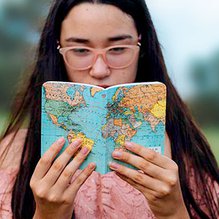
Mobility offer
International mobility is one of the most valuable academic and life experiences we recommend during your university years.
We have agreements with many universities across different continents, so you can choose the one that best fits your academic goals.
Study plan
Study plan structure*
*This degree covers the curricular itinerary of Law 10/2022, of September 6, on the comprehensive guarantee of sexual freedom.
Programa de estudios
PRIMER CURSO
| Materia | ECTS | Tipo | Idioma de impartición |
|---|---|---|---|
| Theory and history of Tourism and the Entertainment Industry | 6 | CORE | English |
| Tourism and the Entertainment Industry Geography | 6 | CORE | English |
| Personal and Professional Efficiency | 6 | CORE | English |
| Mathematics for Tourism | 6 | CORE | English |
| English for Tourism I | 6 | CORE | English |
| Legal Management of Touristic Companies | 6 | CORE | English |
| Touristic Market Structure | 6 | COMPULSORY | English |
| Touristic Business Accounting | 6 | CORE | English |
| Sociology and Social Psychology of Tourism | 6 | CORE | English |
| Cultural Heritage Management | 6 | CORE | English |
SEGUNDO CURSO
| Materia | ECTS | Tipo | Idioma de impartición |
|---|---|---|---|
| Tourism Economics | 6 | CORE | English |
| English for Tourism II | 6 | CORE | English |
| Touristic Business Processes and Operations | 6 | CORE | English |
| Touristic Territorial Resssources | 6 | COMPULSORY | English |
| Touristic and Entertainment Industry Destination Planning | 6 | COMPULSORY | English |
| Entrepreneurship Leadership | 6 | COMPULSORY | English |
| Tax Systems | 6 | COMPULSORY | English |
| Financial Management | 6 | COMPULSORY | English |
| Digital Marketing for Tourism | 6 | COMPULSORY | English |
| Second Foreign Language for Tourism I | 6 | COMPULSORY | French (fr) |
TERCER CURSO
| Materia | ECTS | Tipo | Idioma de impartición |
|---|---|---|---|
| Quality Management and Customer Service | 6 | COMPULSORY | English |
| Human Ressources Management | 6 | COMPULSORY | English |
| Influence and Impact on Business Relationships | 6 | COMPULSORY | English |
| English for Tourism III | 6 | COMPULSORY | English |
| Cost Accounting | 6 | COMPULSORY | English |
| Travel Agency Creation and Management | 6 | COMPULSORY | English |
| New Touristic Trends | 6 | COMPULSORY | English |
| Tourism Intermediation and Commercialization | 6 | COMPULSORY | English |
| Vinitourism and Gastronomy | 6 | COMPULSORY | English |
| Second Foreign Language for Tourism II | 6 | COMPULSORY | French (fr) |
CUARTO CURSO
| Materia | ECTS | Tipo | Idioma de impartición |
|---|---|---|---|
| Technology and Innovation in the Touristic Business | 6 | COMPULSORY | English |
| Ecotourism and Sustainability | 6 | COMPULSORY | English |
| Internship I | 6 | EXTERNAL INTERNSHIPS | English |
| Internship II | 6 | EXTERNAL INTERNSHIPS | English |
| Internship III | 6 | EXTERNAL INTERNSHIPS | English |
| Final Degree Project | 6 | FINAL DEGREE PROJECT | English |
ELECTIVE SUBJECTS - FOURTH YEAR -
| Materia | ECTS | Tipo | Idioma de impartición |
|---|---|---|---|
| Entertainment Activities Design and Management (Cruise and Coastal) | 6 | OPTIONAL | English |
| Intercultural Communication | 6 | OPTATIVA | Inglés (en) |
| University Activities | 6 | OPTIONAL | English |
| Public Relations and Protocol | 6 | OPTATIVA | Inglés (en) |
| MICE Tourism (Meetings, Incentives, Conferences and Events) | 6 | OPTATIVA | Inglés (en) |
Programme implementation
2019/2020.
Number of places for incoming students
100.
Internships
Internships are a key element in your education. Gaining practical experience after what you’ve learned in your degree is the best way to enter the job market.
There are two types of internships: curricular (included in your study plan) and extracurricular (which you can do voluntarily). To participate in a curricular internship, you need to have completed 50% of your credits and register for the corresponding course before starting the internship.
These internships involve monitoring by both the company and the internship supervisor, as well as the completion of a final report for evaluation. If you want to enhance your work experience before finishing your degree, you can undertake extracurricular internships.
These can be done at any stage of your studies, but keep in mind that internships are a complement to your academic training; therefore, the more knowledge you have acquired throughout your degree, the more you will benefit from the internship experience. You can consult the regulations here.
In the Bachelor's Degree in Tourism and Leisure Management, you will gain professional skills in managing tourism and leisure activities and discover the various career paths that this field offers. Curricular internships are an essential part of your education. Currently, we have specific agreements for the Bachelor's Degree in Tourism and Leisure Management, which ensure the proper development of internships as outlined in the study plan.
Company/Institution
- NH Hotels, Spain.
- Turiart travel agent, Spain.
- Pangea Travel Agent, Spain.
- Feria Valencia (Event venue and event organizer) Spain.
- SH Valencia Palace Hotel, Spain.
- Westin Hotel, Worldwide (Mariott international).
- Only You Hotel (Palladium International Hotel Group).
- Plug and play (Tech center) (International).
- SERAWA hospitality Spain.
- Food and Fun (Gastronomic events) Spain.
- Seradem (Touristic consulting). Spain.
- 5 Senses lifestyle (DMC) Spain.
- Granada Convention Bureau. Spain.
- Valencia Convention Bureau. Spain.
- Melia hotels International.
- IKOS Dassia (Hospitality services, Greece).
- Amanpuri hotels (Indonesia).
Employability
After studying tourism in Valencia, you will be able to anticipate, adapt to and take advantage of the many economic, political, social and cultural phenomena that impact this sector. Becoming a versatile and strategic professional increasingly in demand by companies.
Career oportunities
- Management of tourism companies.
- Planning of tourist destinations.
- Management and touristic advantage of products and activities concerning natural resources, sports, and in particular, all leisure-related developments.
- Create and manage professional teams that exercise these roles.
- Leading and undertaking tourism projects, both nationally and internationally.
Admissions
Start your future at Universidad Europea
You can become a student at Universidad Europea in three easy steps.
1
Admission exams
Start your admission process by calling +34 961113845 or request information and our advisors will contact you.
2
Place reservation
Once you have been admitted, secure your place by paying the reservation fee.
3
Enrollment
Submit the required documents to formalise your enrollment.
Scholarships and financial aid
We want to help you. If you want to study at Universidad Europea, you will have at your disposal a wide selection of own and official scholarships.
Credit recognition and transfers
You don’t have to stick with something you don’t like. That’s why we’ve designed specific plans for credit recognition and transfers.
Request your online credit recognition review, transfer your academic file and start studying at Universidad Europea.
Profile for students and admissions requirements
It is a degree designed for students with a creative and entrepreneurial profile, with the ability to meet the needs of the public and, above all, oriented to market changes and customer needs, with a positive predisposition towards geographic mobility and language learning, all of them oriented to learning based on the skills needed to develop tasks of analysis, planning, organization, management and control in the field of productive organizations in the tourism sector at national and international level.
- Admissions requirements
- Competences and skills test and personal interview
- Evaluation of academic record.
- Language test, being a degree that is taught 100% in English, it is necessary to take a language test.
Admissions process
At Universidad Europea de Valencia, we offer you a commitment-free guidance programme to help you make the best decision for your future.
Our team of advisors and professors will provide you the necessary information about our academic offer, the Spanish education system in general, and more specifically, the University degree programmes—the legal requirements for access to these studies, etc.
Admissions tests:
- Competences and skills assessment test.
- Assessment of your English level and, if Spanish is not your native language, assessment of your Spanish level.
- Personal interview
- The results of your admissions tests will serve to develop your abilities to the fullest during your time at our University—with the guidance of your academic mentor—achieving your academic, language learning and professional goals.
It is not necessary to prepare for the admissions tests in advance, as they assess skills, not memorisation.
In order to apply for admission to other degree programmes, students must submit the following documentation to the Universidad Europea de Valencia Admissions Department, in scanned digital format (pdf document) by e-mail, to the following address: ads.valencia@universidadeuropea.es or to their advisor’s email.
Open days
We know that now is an important moment to progress in your professional future. That is why we open our virtual doors to you and invite you to join us. We want you to meet the director of your programme and solve all possible doubts you have. You’ll also discover what makes our students and our online methodology unique.
07 March
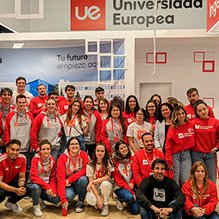
Come and see the campus
Get to know the facilities and discover why Universidad Europea is made for you.
Faculty
The faculty on this degree has 53,33% of doctors.
Our teaching staff
- Emmanuel Haze
Academic director - Maria Sánchez de Mora.
PhD in Economics and Tourism, Bachelor’s in Tourism and in Advertising and PR. - Anna Gribova
BSc in Management Science—LSE and MSc in Accounting and Auditing—UV. - María Ángeles Casabo
PhD in Law and Bachelor of Art History and Law. - Lynn Summerfield
PhD in Education and Master of Higher Education—Universidad Europea de Madrid. - Eva Piera
Bachelor’s in English Philology and in Advertising and PR, and Master’s in Cultural Communication. - Hyeon-Jin Lee
PhD candidate, Bachelor’s in Tourism Business Administration and Management, and Master’s in Tourism Organisations and Companies. - Issa Torres
PhD Candidate, Bachelor’s in Tourism, Master’s in Project Management and Cultural Tourism. - Ibrahim Casanova
Bachelor’s in Conference Translation and Interpretation. - Clara Gómez
PhD in Languages, Literatures and Cultures. Universidad de Valencia. Bachelor’s in Modern Languages, and Master’s in Research in Languages and Literatures. - Albert Budica
PhD in Agricultural marketing / Agronomy. CEO of own Digital marketing company.
Tittle coordination table
CV of the degree’s faculty
Frequently Asked Questions
What can you do with a leisure and tourism degree?
A degree in leisure and tourism management will open doors to a varied career in the tourism sector, leading companies and organistions at a time of change in how consumers travel, and the needs of the industry to adapt to more sustainable models.
Examples of careers that our students go into include:
- Management of tourism companies.
- Planning of tourist destinations.
- Management and tourism products and activities concerning natural resources, sports, and leisure-related developments.
- Leading and undertaking tourism projects, both nationally and internationally.
What do tourism students do?
As a tourism student at Universidad Europea, you will receive a broad education, allowing you to gain the skills and experience necessary to choose your area of specialism once you graduate.
Our study plan includes subjects such as Legal Management of Touristic Companies, Touristic Business Accounting, Human Resources Management, and Technology and Innovation in the Tourism Business.
You also can choose from a number of elective subjects such as Health and Beauty tourism, active and rural tourism, and intercultural communication.
What is leisure and tourism management?
Leisure and tourism management is a huge and growing sector that comprises different areas and spectrums. People wanting to work in this sector should be aware that it includes areas such as:
- airlines,
- hotels,
- attractions,
- travel agencies,
- activity providers,
- shopping centers,
- cruises, attractions,
- destinations,
- tour operators.
Careers within this industry cover areas such as marketing, finance, human resources, operation management and more!
Where can I study a tourism degree?
At Universidad Europea, we will prepare you for an international career within the tourism sector. Our program will allow you to gain the skills and knowledge needed, and you’ll be able to enjoy study abroad options in many countries across the world including in the UK, Canada, USA and France.
You’ll also be able to complete internships and work placements at leading tourism companies and organisations.

